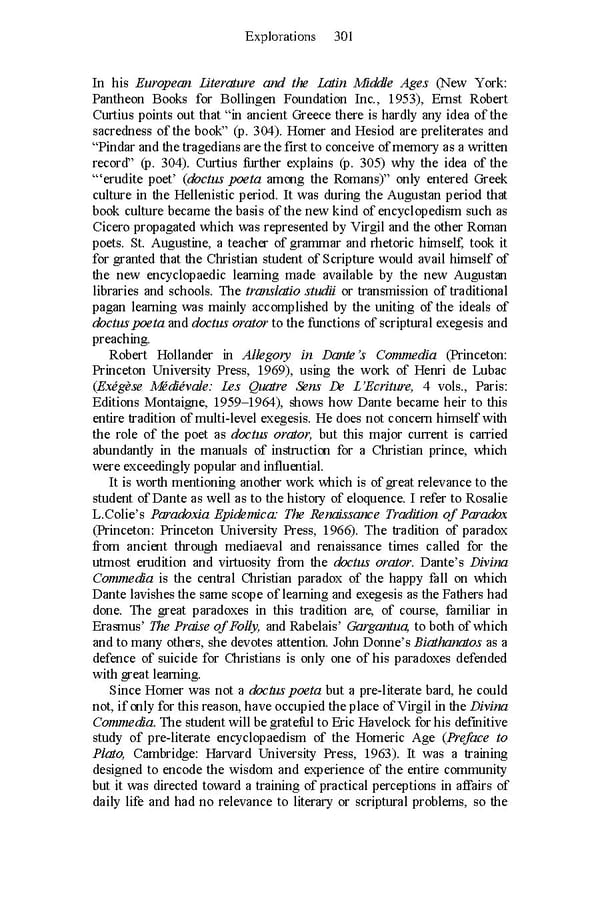Explorations 301 In his European Literature and the Latin Middle Ages (New York: Pantheon Books for Bollingen Foundation Inc., 1953), Ernst Robert Curtius points out that “in ancient Greece there is hardly any idea of the sacredness of the book” (p. 304). Homer and Hesiod are preliterates and “Pindar and the tragedians are the first to conceive of memory as a written record” (p. 304). Curtius further explains (p. 305) why the idea of the “‘erudite poet’ (doctus poeta among the Romans)” only entered Greek culture in the Hellenistic period. It was during the Augustan period that book culture became the basis of the new kind of encyclopedism such as Cicero propagated which was represented by Virgil and the other Roman poets. St. Augustine, a teacher of grammar and rhetoric himself, took it for granted that the Christian student of Scripture would avail himself of the new encyclopaedic learning made available by the new Augustan libraries and schools. The translatio studii or transmission of traditional pagan learning was mainly accomplished by the uniting of the ideals of doctus poeta and doctus orator to the functions of scriptural exegesis and preaching. Robert Hollander in Allegory in Dante’s Commedia (Princeton: Princeton University Press, 1969), using the work of Henri de Lubac (Exégèse Médiévale: Les Quatre Sens De L’Ecriture, 4 vols., Paris: Editions Montaigne, 1959–1964), shows how Dante became heir to this entire tradition of multi-level exegesis. He does not concern himself with the role of the poet as doctus orator, but this major current is carried abundantly in the manuals of instruction for a Christian prince, which were exceedingly popular and influential. It is worth mentioning another work which is of great relevance to the student of Dante as well as to the history of eloquence. I refer to Rosalie L.Colie’s Paradoxia Epidemica: The Renaissance Tradition of Paradox (Princeton: Princeton University Press, 1966). The tradition of paradox from ancient through mediaeval and renaissance times called for the utmost erudition and virtuosity from the doctus orator. Dante’s Divina Commedia is the central Christian paradox of the happy fall on which Dante lavishes the same scope of learning and exegesis as the Fathers had done. The great paradoxes in this tradition are, of course, familiar in Erasmus’ The Praise of Folly, and Rabelais’ Gargantua, to both of which and to many others, she devotes attention. John Donne’s Biathanatos as a defence of suicide for Christians is only one of his paradoxes defended with great learning. Since Homer was not a doctus poeta but a pre-literate bard, he could not, if only for this reason, have occupied the place of Virgil in the Divina Commedia. The student will be grateful to Eric Havelock for his definitive study of pre-literate encyclopaedism of the Homeric Age (Preface to Plato, Cambridge: Harvard University Press, 1963). It was a training designed to encode the wisdom and experience of the entire community but it was directed toward a training of practical perceptions in affairs of daily life and had no relevance to literary or scriptural problems, so the
 Essential McLuhan Page 307 Page 309
Essential McLuhan Page 307 Page 309